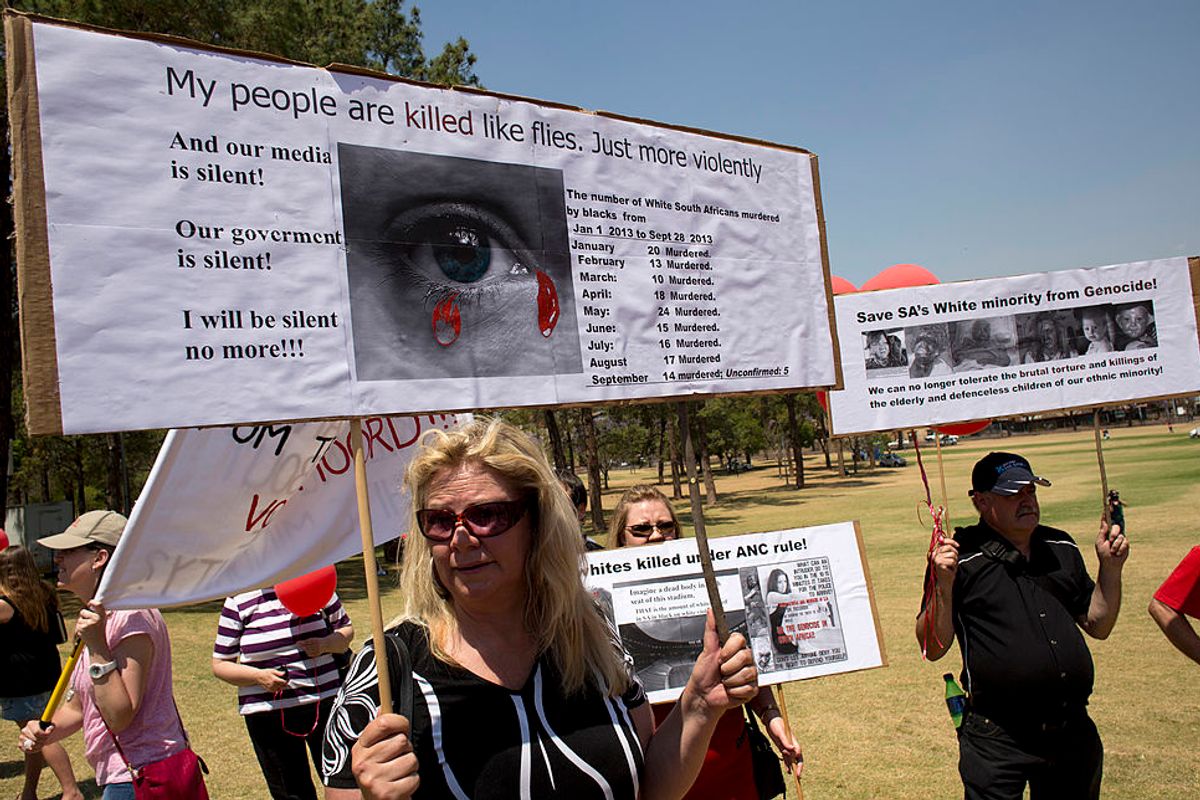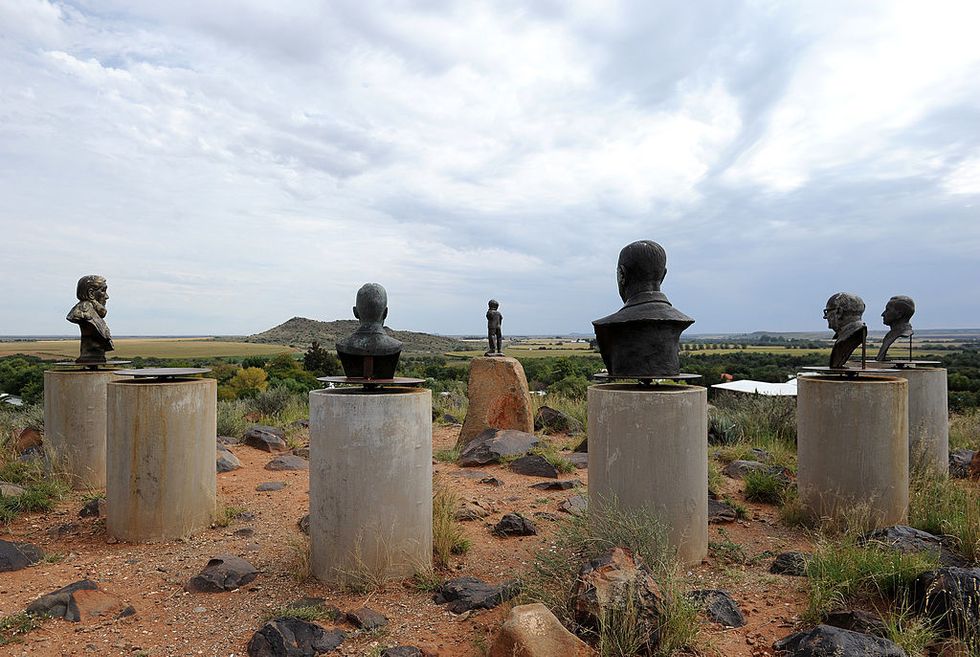Op-Ed: Laying Bare South Africa's 'White Lie'
There are many persecuted minorities in the world—white South Africans are certainly not one of those.

White South Africans hold placards during a protest against the violent murder of farmers which they term "genocide and oppressive state policies in favour of blacks" in Pretoria on October 10, 2013.
For years, and particularly in the last five years, there has been a push through the media by white South Africans to present themselves to the international community as a persecuted minority and one whose persecution has been heightening. The narrative that there has been an ongoing "white genocide" taking place in South Africa has been gaining worrying traction with various governments from the West responding to this false and dangerous claim. Frankly speaking, this claim would be hilarious, given its ludicrousness, were it not so devastating for a majority-Black country barely recovering from decades of racial segregation at the hands of an Apartheid regime whose legacy still lives on today in egregious ways.
At a time when Black people around the world, minorities and otherwise, have been leading massive movements against police brutality, systemic racism, human rights violations and corrupt governments, it is vital to dispel dangerous notions of white South Africans being a persecuted minority when the reality is the exact opposite.
The belief that there is a white genocide in South Africa is not new. It stems from the continued and false assertion that white farmers are deliberately being targeted and murdered because they are white. Now, while it is certainly true that there are farm attacks and murders in the country, these are reportedly a tiny fraction of the country's overall homicide rate with Africa Check's senior researcher, Kate Wilkinson, citing in an interview the inaccuracy of the figures. "Until we can be sure what murders are being measured and what definition is being used to estimate the total population size, we can't calculate this figure."
Of course, that has not stopped right wing political parties such as the Freedom Front Plus from arguing during a 2017 parliamentary debate that farm murders are three times the national homicide rate––and all with a straight face. And so it becomes clear that the issue of farm murders, which seldom makes mention of Black farmers (who are just as vulnerable to attacks as white farmers), is far more political than it is accurate. Political analyst, Ryan Cummings, put it this way in a tweet: "South Africa must be the only country in the world where a genocide is ongoing but where the victims still employ their murderers to tend to their gardens, clean their homes & walk their dogs."
However, in an age where fake news and misinformation tends to be shared up to 70 percent more than legitimate information on social media, it is not difficult to understand how the myth of this white genocide can exponentially amass popularity, and with the right financial resources, reach the offices of those in power. In 2018, the Australian government gave serious consideration to fast-tracking humanitarian visas to white South Africans on the basis of "land seizures and violence," both of which were unfounded. Furthermore, former President Donald Trumptweeted a series of posts about the "land seizures and the large scale killing of white farmers" and even announced that his then Secretary of State would keep a "close eye" on South Africa.
What is particularly upsetting, is how in spite of their propaganda, white South Africans have continued to treat Black South Africans with such incredible inhumanity. Many people are aware of these infamous farm murders but how many of them equally know about 16-year-old Matlhomola Mosweu, a Black teenage boy from Coligny, North West, who was murdered by two white farmers, Pieter Doorewaard and Phillip Schutte for allegedly stealing a few sunflowers. Sunflowers. The pair caught Mosweu and proceeded to throw him from the back of their moving truck.
What is uncanny about white South Africans claiming persecution, is how they have, over decades, made considerable efforts to separate themselves from the rest of the country and govern themselves as a people under a sovereign state. Relatively new "white-only " settlements such as Eureka are just a continuation of long-established places like Orania, an entire town only open for residence to white South Africans and more specifically Afrikaans-speaking white South Africans.
Unlike the mythical city of Atlantis, this town exists in plain view and the South African government has been lethargic when it comes to addressing how it is a stumbling block in the country's progress towards a non-racial society. Established in 1991, Orania is almost completely self-sufficient with monuments celebrating the prominent architects of Apartheid, the old Apartheid flag and even a separate currency known as the Ora as opposed to the South African Rand. Naturally, and is always the argument, all of this is to "preserve" Afrikaner culture and heritage. Orania feeds into the grand idea of establishing a volkstaat which effectively seeks self-determination among Afrikaans people in a way that is separate from the rest of the country. While this has not been enacted into the law, it is already the de facto reality.

It bears asking then, how can white South Africans, on one hand, position themselves as victims, but on the other hand, insist that white rule remains supreme? The two are admittedly mutually exclusive.
While the main opposition party, the Democratic Alliance (DA), has always claimed to be in favor of a non-racial society that serves all South Africans, of late, it has become undeniably clear that the party panders unabashedly to white interests and as a result, has lost key Black leaders of the likes of Mmusi Maimane and Herman Mashaba. In a recent anti-racism protest that saw violence erupting between members of the Economic Freedom Fighters (EFF) and parents at Brackenfell High School, a tweet from the DA likened the EFF to "Nazis in brown shirts" on the anniversary of Kristallnacht, where Jews were attacked by SA paramilitary forces throughout Nazi Germany in 1938.
Furthermore, the dynamic that exists between white South Africans and the police, is an important one to consider as it has permitted them to enjoy great freedoms in the country as a result.
In 2016, when the nationwide Fees Must Fall protests denouncing the financial exclusion of poor students erupted, the South African Police Services (SAPS) and private security forces were brought in to maintain "law and order." Black students under attack quickly realised that if white students formed human shields around them, the police would simply not shoot. The police were largely Black officers but their regard was for white students instead. That image remains a difficult one and one that still brings tears to my eyes, as a former student leader, four years later.
The following year, there were protests calling for the resignation of then-president, Jacob Zuma. Again, the interactions between the police and Black people compared to white people, were vastly different. White "protesters" took selfies with police officers and even walked alongside them at times during the march. In stark contrast, at the beginning of the COVID-19 lockdown earlier this year, more Black men were killed by the police and members of the South African National Defence Force (SANDF) than by the coronavirus outbreak itself. Collins Khosa, Sibusiso Amos, Petrus Miggels and Adane Emmanuel were their names.
One would think that the non-threatening relationship that exists between white South Africans and law enforcement would ease their fears of being completely wiped out. The opposite is true. White Afrikaners especially are preparing for a civil war. Some of them even send their children to "survival" bootcamps that teach tactical training, denounce leaders like the late anti-Apartheid veteran Nelson Mandela, introduce the notion that Black people are dangerous and sing Die Stem, the national anthem under Apartheid, all while burning the new South African flag and flying the old one.
South Africa's White Supremacist Training Campswww.youtube.com
With the majority of the land in the possession of white South Africans, ample financial resources and institutionalised racism maintaining their place in positions of power, only concerted political effort can stop them. However, the current African National Congress (ANC)-led government is consumed with looting state coffers and has no seeming interest in addressing the growing and potentially devastating repercussions of racism in this country.
The victimhood alleged by white South Africans is not by accident but design. History shows us that atrocities against white people, real or not, will always be avenged and that is a trump card white South Africans are keeping in their back pocket. It is no longer enough to quote Mandela and struggle leaders of the past. It is not nearly enough to spew rhetoric about a non-racial South Africa when racism is the neighbour from whom one regularly visits to borrow sugar. Racism is still sitting at the dinner table as the star of the show in much the same way it did under Apartheid. Essentially, very little has changed.
This concept of a rainbow nation filled with "colour blindness" and all manner of unicorns is a delusion and in the words of one great lyricist, Cardi B, "This ain't Disney."
- There is No 'White Genocide' Happening in South Africa, So Why is ... ›
- President Trump Sent Officials to Investigate Land Expropriation in ... ›
- Donald Trump, White Victimhood and the South African Far-Right ... ›
- Eureka is a New South African Settlement for White People Only ... ›
- Flying the South African Apartheid Flag Constitutes Hate Speech ... ›
- Celebrity Status Meets Ignorance: Tyrese Gibson Angers South ... ›
- South African Sports Stars Speak Out Against Racism - OkayAfrica ›
- South Africa Reopens Inquests into Death of Nobel Laureate and Anti-Apartheid Leader Albert Luthuli - Okayplayer ›
- Propaganda By a Nationalist Group Stokes Fear About South Africa’s New Land Bill | OkayAfrica ›

